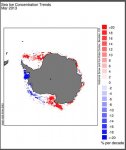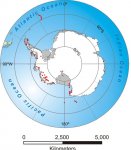- Joined
- Jun 10, 2009
- Messages
- 27,254
- Reaction score
- 9,350
- Gender
- Male
- Political Leaning
- Liberal
Instead of hiding behind your strawman again why not just answer the questions put to you instead. Getting back on topic . Why do you feel what is happening on the Antarctic peninsula is more significant than what is happening on the continent as a whole ? Why did Antarctica break its all time observed sea ice coverage record just last year when we are supposed to still be warming ? Are you actually going to ever debate the thread you initiated or just go on waving a flag ? :roll:
You've already admitted in this thread you are a conspiriacist so go play with your fellow conspiracists.



